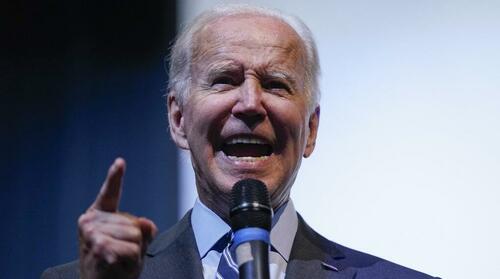Here's A List Of Biden Tax Hikes Which Take Effect Jan. 1
When the Democrats finally passed the "Inflation Reduction Act" in 2022 (how's that going?), they included several tax hikes set to take effect on Jan. 1, 2023.
Americans for Tax reform's Mike Palicz has conveniently compiled a list of them, along with his take on their intended effects:
$6.5 Billion Natural Gas Tax Which Will Increase Household Energy Bills
Think your household energy bills are high now? Just wait until the three major energy taxes in the Inflation Reduction Act hit your wallet. The first is a regressive tax on American oil and gas development. The tax will drive up the cost of household energy bills. The Congressional Budget Office estimates the natural gas tax will increase taxes by $6.5 billion.
And of course, this tax hike violates Biden's pledge not to raise taxes on Americans making under $400,000 per year. According to the American Gas Association, the methane tax will slap a 17% increase on the average family's natural gas bill.
$12 Billion Crude Oil Tax Which Will Increase Household Costs
Next up - a .16c/barrel tax on crude oil and imported petroleum products which will end up on the shoulders of consumers in the form of higher tax prices.
The tax hike violates President Biden’s tax pledge to any American making less than $400,000 per year.
As noted above, Biden administration officials have repeatedly admitted taxes that raise consumer energy prices are in violation of President Biden’s $400,000 tax pledge.
As if it weren’t bad enough, Democrats have pegged their oil tax increase to inflation. As inflation increases, so will the level of tax.
$1.2 Billion Coal Tax Which Will Increase Household Energy Bills
This one increases the current tax rate on coal from $0.50 to $1.10 per ton, while coal from surface mining would increase from $0.25 per to to $0.55 per ton, which will raise $1.2 billion per year in taxes that will undoubtedly be passed along to consumers in the form of higher energy bills.
$74 Billion Stock Tax Which Will Hit Your Nest Egg — 401(k)s, IRAs and Pension Plans
Democrats are now imposing a new federal excise tax when Americans sell shares of a stock back to a company.
Raising taxes and restricting stock buybacks harms the retirement savings of any individual with a 401(k), IRA or pension plan.
Union retirement plans will also be hit.
The tax will put U.S. employers at a competitive disadvantage with China, which does not have such a tax.
Stock buybacks help grow retirement accounts. Raising taxes and restricting buybacks would harm the 58 percent of Americans who own stock and more than 60 million workers invested in a 401(k). An additional 14.83 million Americans are invested in 529 education savings accounts.
Retirement accounts hold the largest share of corporate stocks, accounting for roughly 37 percent of the outstanding $22.8 trillion in U.S. corporate stock, according to the Tax Foundation.
In 2017, corporate-sponsored funds made up $4.45 trillion in market value; union-sponsored funds accounted for $409 billion; and public-sponsored funds, which benefit teachers and police officers, added up to $4.25 trillion.
A tax on buybacks could dissuade companies from doing so, and US companies will face significant compliance costs, which will - again, be passed along to consumers.
$225 Billion Corporate Income Tax Hike Which Will Be Passed on to Households
American businesses reporting at least $1 billion in profits over the past three years will now face a 15% corporate alternative minimum tax, which will be passed along in the form of higher prices, fewer jobs and lower wages, according to Americans for Tax Reform.
A Tax Foundation report from last December found a 15 percent book tax would reduce GDP by 0.1 percent and kill 27,000 jobs.
Preliminary cost estimates from the Congressional Budget Office found the provision would increase taxes by more than $225 billion.
According to JCT’s analysis, 49.7 percent of the tax would be borne by the manufacturing industry at a time when manufacturers are already struggling with supply-chain disruptions.
Which industry will likely be most affected? According to the Tax Foundation, "the coal industry faces the heaviest burden of the book minimum tax, facing a net tax hike of 7.2 percent of its pretax book income, followed by automobile and truck manufacturing, which faces a 5.1 percent tax hike."
https://ift.tt/ntqTCHA
from ZeroHedge News https://ift.tt/ntqTCHA
via IFTTT





0 comments
Post a Comment